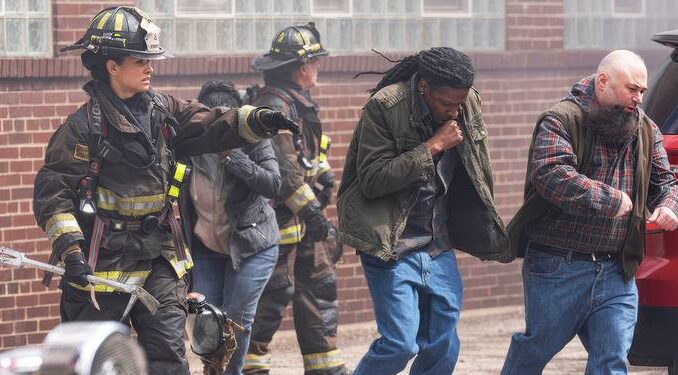
For years, Chicago Fire has been known for its emotional storytelling, powerhouse ensemble, and the found-family bond that made Firehouse 51 one of TV’s most beloved crews. But as Season 14 ignites, even the show itself is starting to acknowledge what fans have been whispering for seasons: the firehouse we once knew doesn’t feel quite the same.
And for once, someone on screen actually said it out loud.
In the Season 14 premiere, aptly titled “Kicking Down Doors,” longtime fan favorite Mouch McHolland (Christian Stolte) breaks the fourth wall — not literally, but emotionally — by voicing the frustration that both the firefighters and the fans have been feeling. After welcoming yet another new recruit, Sal Vasquez (Brandon Larracuente), Mouch doesn’t even try to hide his cynicism:
“I get to know Carver, he leaves. I get to know Damon, he’s transferred. I figure, I ignore this guy, he’ll stick around.”
It’s the kind of brutally honest line that lands because it’s true — too true.
The Harsh Reality Fans Have Been Feeling for Years
Chicago Fire has weathered countless onscreen infernos, but its most enduring challenge might be the one happening behind the scenes: constant cast turnover.
Since Season 11, Firehouse 51 has bid farewell to a shocking number of core players — Matt Casey (Jesse Spencer), Sylvie Brett (Kara Killmer), Blake Gallo (Alberto Rosende), Wallace Boden (Eamonn Walker), Sam Carver (Jake Lockett), Derrick Gibson (Rome Flynn), and Jack Damon (Michael Bradway). And as fans brace for Darren Ritter’s (Daniel Kyri) confirmed exit, it’s clear that the heart of the show has been under constant reconstruction.
It’s not that Chicago Fire hasn’t rebounded from losses before — the show has been doing that since Season 1. But the churn has become so frequent that even the most loyal fans are starting to feel fatigued.
The show’s original magic came from stability — watching familiar faces grow together through personal struggles and professional heroics. When characters like Severide, Kidd, Boden, and Mouch anchored the series, viewers could count on emotional continuity even as fires raged around them. Now, with each passing year, that continuity feels thinner.
A Storyline That Mirrors Reality
Mouch’s remark isn’t just a throwaway joke — it’s an emotional mirror for the audience. His resignation about forming new bonds after so many losses captures exactly what many viewers have been feeling: the grief of watching beloved characters disappear with little warning.
The new additions, like Vasquez, are compelling on paper. A rebellious firefighter with something to prove, he immediately stirs things up under Stella Kidd (Miranda Rae Mayo). But as Mouch himself points out, how can anyone — character or viewer — get attached if every new face might vanish within a year?
That fatigue is palpable, even among the cast. The emotional stakes of Chicago Fire have always relied on deep, ongoing relationships: the brotherhood between Severide and Casey, the mentorship between Boden and his crew, the love story between Kidd and Severide. When those bonds are constantly tested by departures, the show risks losing the emotional anchor that made it stand apart from other Dick Wolf dramas.
When Change Becomes Too Constant
Every long-running series evolves, and Chicago Fire has never been afraid of change. But the question Season 14 seems to be asking — both in its script and through its characters — is whether too much change can burn out even the strongest flame.
The showrunner Andrea Newman has been open about wanting to balance nostalgia with renewal, but even she admits there’s turbulence ahead. “We’re in a transitional period,” she recently told TV Insider. “The firehouse is shifting, and everyone’s feeling that instability — on and off screen.”
That “instability” is the key word. It’s what Mouch feels when he meets yet another rookie. It’s what Violet feels as she juggles new ambulance duties amid staff shortages. It’s what the audience feels every time a character says goodbye.
What the Future Holds for Firehouse 51
Still, there’s reason for cautious optimism. The Season 14 premiere hints at an effort to reconnect with the show’s roots: camaraderie, mentorship, and heart. With Stella and Severide preparing for parenthood and Chief Pascal (Dermot Mulroney) finding his footing after his personal loss, Chicago Fire seems poised to rebuild not just its firehouse, but its emotional foundation.
If handled right, the instability could even serve as the catalyst for renewal — a reminder that even after loss, Firehouse 51 always finds a way to rebuild.
But to truly reignite its spark, Chicago Fire must do more than survive the revolving door of cast changes. It must once again make viewers care — not just about who’s next, but about who’s still here.
“Maybe if I ignore this guy, he’ll stick around,” Mouch says.
It’s a funny line, but it’s also a plea — one that echoes what longtime fans have been thinking for years.
Here’s hoping someone in Firehouse 51 finally listens.